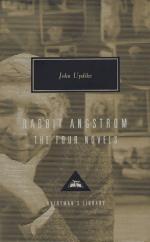|
This section contains 5,934 words (approx. 20 pages at 300 words per page) |

|
SOURCE: “John Updike's Prose Style: Definition at the Periphery of Meaning,” in Critique: Studies in Contemporary Fiction, Vol. XXX, No. 4, Summer, 1989, pp. 277–90.
In the following essay, Fleischauer examines the language and syntax of Updike's prose, particularly aspects of irony, symbolism, and literary detachment evoked in his use of descriptive vocabulary and imagery.
John Updike has occupied a place near the center of the American literary scene for over twenty years. From the beginning, his works have attracted critical attention, most of it controversial, and at the heart of the commentary about Updike's prose has been a recognition of his distinctive style.
Throughout his career, a recognizable mark of Updike's linguistic signature has been the predictable appearance in stories and novels of striking adjectives and unexpectedly appropriate metaphors. In an October 1979 review of Problems and Other Stories, John Romano refers to both the metaphor and the “writer's word,” an...
|
This section contains 5,934 words (approx. 20 pages at 300 words per page) |

|


